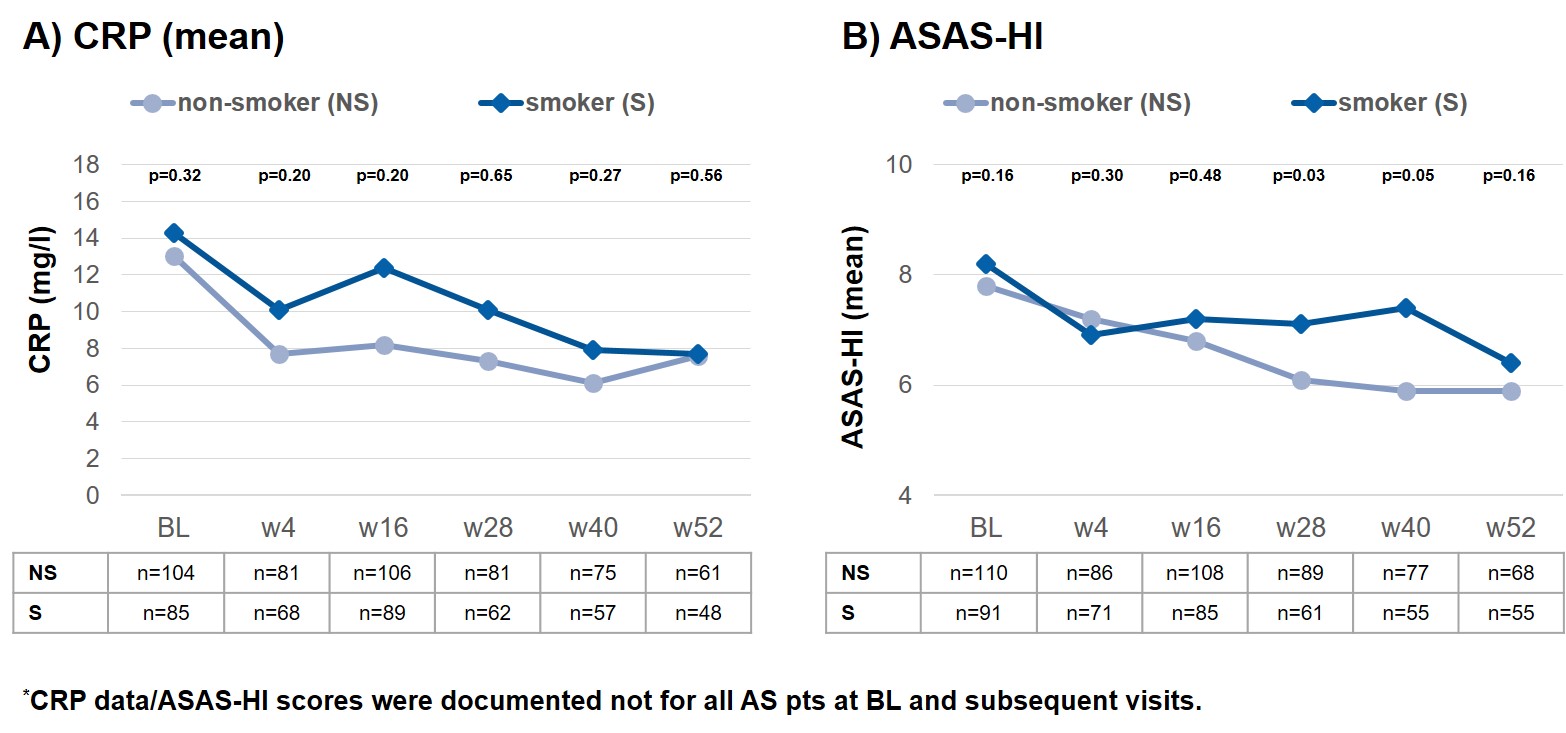Session Information
Date: Friday, November 6, 2020
Title: Spondyloarthritis Including Psoriatic Arthritis – Treatment Poster I
Session Type: Poster Session A
Session Time: 9:00AM-11:00AM
Background/Purpose: There is growing body of evidence that smoking is associated with more active and severe disease in patients (pts) with ankylosing spondylitis (AS)1,2. The German non-interventional study AQUILA provides real-world data on the influence of smoking on therapeutic effectiveness and safety under secukinumab (SEC), a fully human monoclonal antibody that selectively inhibits interleukin-17A.
The aim of this interim analysis is to describe selected baseline (BL) demographics, to evaluate SEC effectiveness on disease activity and global functioning and health, and to report safety profile depending on smoking status of AS pts.
Methods: AQUILA is an ongoing, multi-center, non-interventional study including up to 2700 pts with active AS or psoriatic arthritis. Pts were observed from BL up to week (w) 52. Real-world data was assessed prospectively and analyzed as observed. Assessment of CRP and validated questionnaires were used to collect data on disease activity (Bath Ankylosing Spondylitis Disease Activity Index, BASDAI), global functioning and health (Assessment of SpondyloArthritis-Health Index, ASAS-HI) and depressive mood (Beck´s Depression Inventory version II, BDI-II). For calculation of proportion of pts who experienced (serious) adverse events ((S)AEs), all AS pts were included who received at least one dose of SEC irrespective of further documentation of any study visit. This analysis focuses on the subgroups non-smoker (NS) and smoker (S).
Results: At BL, 311 AS pts were included: 42.1% (n=131) NS and 32.8% (n=102) S. Remaining subgroups were 15.1% (n=47) ex-smoker and 10.0% (n=31) of unknown smoking status. About half of AS pts in NS were male, while in S (69.6%) portion of men was more than twice as high as of women. S were slightly younger than NS (mean age: 43.9/49.0 years). During the study, CRP value decreased irrespective of smoking status with numerically higher fluctuations in S (Fig. 1A). BASDAI (NS: 5.2 at BL to 3.7 at w52, S: 5.6 at BL to 4.1 at w52) and ASAS-HI (Fig. 1B) scores numerically improved best in NS, whereas more variations were seen in S; the same was observed for BDI-II score values (NS: 11.8 at BL to 9.2 at w52, S: 13.0 at BL to 12.1 at w52). Although no major significant differences in mean values existed between NS and S, S displayed – except in w4 – overall higher mean values in the parameters mentioned above. Regarding the occurrence of AEs/SAEs with or without suspected relationship to SEC, there was no significant difference between NS and S (Table 1).
Conclusion: In a real-world setting, SEC improved disease activity and global functioning and health in AS pts with slight (mostly non-significant) differences between NS and S. Overall, this interim analysis shows that SEC is an effective treatment with a favorable safety profile up to 52 weeks, irrespective of the pts’ smoking status. Further progress of the AQUILA study will reveal whether this trend will continue.
 Figure 1: CRP and global functioning and health in AS pts treated with SEC depending on smoking status*
Figure 1: CRP and global functioning and health in AS pts treated with SEC depending on smoking status*
 Table 1: Overview of AEs (and SAEs) under SEC treatment depending on smoking status in AS pts
Table 1: Overview of AEs (and SAEs) under SEC treatment depending on smoking status in AS pts
To cite this abstract in AMA style:
Riechers E, Kiltz U, Brandt-Jürgens J, Kästner P, Peterlik D, Tony H. Does Smoking Affect Secukinumab Treatment Outcomes and Safety in Patients with Ankylosing Spondylitis? – Real World Data from German Observational Study [abstract]. Arthritis Rheumatol. 2020; 72 (suppl 10). https://acrabstracts.org/abstract/does-smoking-affect-secukinumab-treatment-outcomes-and-safety-in-patients-with-ankylosing-spondylitis-real-world-data-from-german-observational-study/. Accessed .« Back to ACR Convergence 2020
ACR Meeting Abstracts - https://acrabstracts.org/abstract/does-smoking-affect-secukinumab-treatment-outcomes-and-safety-in-patients-with-ankylosing-spondylitis-real-world-data-from-german-observational-study/
